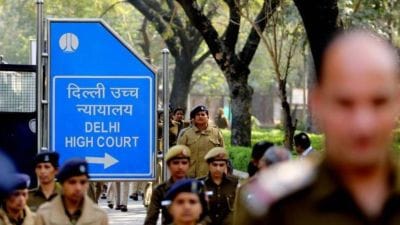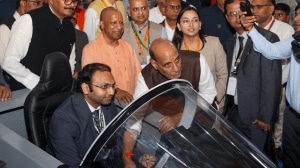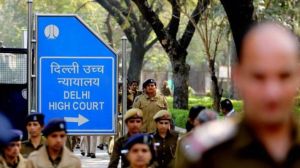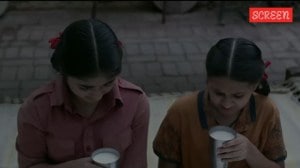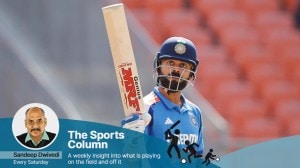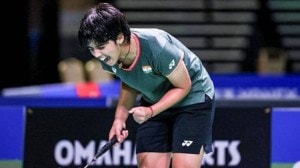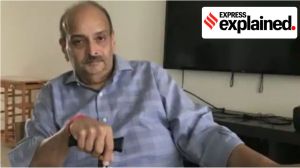‘I sing, why should you ask my age? I can perform for 3 hours…But I would not sing for 25-yr-olds in films’
• My guest today is somebody you know more for his voice than his face, and he’s not complaining because he is the last survivor o...

• My guest today is somebody you know more for his voice than his face, and he’s not complaining because he is the last survivor of the golden age of Indian melody. Manna Dey, or Prabodh Chandra Dey as he was named. You know why we have chosen this venue for the interview, the Hooghly river.
I was born here in Calcutta.
• That’s one reason. But my reason is that since I’m a fan of yours, like millions of Indians, I’ve always remembered one of the great melodies you sang, O Maajhi re, khete jao re, door hai kinara.
That was Ravindra Jain’s song. For Saudagar. Amitabh Bachchan starred in the film, and that was a wonderful composition. I would rate him as one of the most talented…
• You have sung more than 4,000 songs…
Well, if you pinpoint any song and tell me to sing it, I can sing a couple of lines.
• O Majhi Re…, now this is the perfect setting for the song. It’s a monsoon sky in Calcutta, on the Hooghly.
Yes, we are in the middle of the Ganga, Kinara door hai na.
• You still sing so well. I know you may not want me to reveal your age but what’s the secret of this fitness, this voice discipline at 84-85?…You were born on May Day.
Yes, 1st of May. But I really don’t understand why people comment on my age. I sing, why should you ask my age? Age is no factor, I don’t consider age any deterrent in my life. I keep healthy, I try to keep myself fit and whenever I’m asked to sing, I can perform for three hours, nothing happens to me.
• But you stopped singing for Hindi movies sometime back. Why?
Being whatever I am at this age, I would not like to sing for 25-year-olds.
• But even in your heydays, you didn’t always sing for the 25-year-olds. Sometimes you were in the background.
The funniest thing is I started my career singing for Badrinarayanji, who was old enough to be my father. Gayee tu gayee Sita sati, teri amar bhavana amar rahi in Ram Rajya. That movie ran for three years at a stretch, Ram Rajya by Prakash Pictures.
• I’m sure if you got back to singing, you will give many of the new singers a run for their money.
Oh yes, I can do that, definitely.
• Just go down memory lane and tell us how you started. I know you trained under your great uncle K C Dey and then came to Bombay. What was music like those days?
Music was very pure. The sound of the voice, of the musical instruments used to be so natural, and there were no machines with which you could improve a voice. Those days you had to have a good voice to be able to sing. A good voice and good musicians to play with you, so that you could deliver the goods. Any musician, any music director who used to compose used to ask for the very best; it was natural in those days. I’m from that school of music where we have always believed in singing not the camouflaged way but the most natural way.
You’ll be surprised to know this Shekharji, the song that was composed by Roshanji Na to caravan ki talash hai, na to humsafar ki talaash hai, that is a 12-minute song. It was cut into two parts. I, Rafi, Asha, we sang that song 6 minutes each without a break.
• It’s one of the most famous Qawwalis of all time.
I would rate it as one of the very best.
• There are so many evergreens we remember. From Waqt, there is Ae meri zohre jabin, which is still sung at weddings, at least in the north.
Why north? Even in Canada, even in Gujarat, even in Maharashtra, in Punjab, everywhere it is sung.
• Although most people don’t know the meaning of those heavy Urdu words.
Jis dhang se Balrajji sang that song…
• Looked like an ideal romance…
Yes, absolutely. the language was so…Isme na samajhne ki kya baat hai?
• Tell us about your struggling days. When you came, there were already other famous people singing.
No, not many famous people. There were a handful of male singers.
• K L Sehgal?
No, during our days K L Sehgal was not there. My uncle, K L Sehgal and Punkuj Mullick, those were the people who had just finished, and we had come in.
• But the gold standard was still K L Sehgal’s voice.
Yes, singing used to be different those days. K L Sehgal’s singing used to be a class in itself. And our kind of singing, we learnt good music and then came into this line.
• But you struggled a bit, and many of us believe, and I think you will not disagree, that you did not quite get the credit that Kishore Kumar, Mohammad Rafi and Mukesh and your other contemporaries got. And yet many of the songs you have sung will perhaps outlast many that they sang.
Yes, you’re very right there. I was singularly lucky to have been chosen for some of the most beautiful and very difficult songs. That’s why they keep lingering even today, and I think those songs will never die. For instance Laga chunri mein daag chupaon kaise, Ae mere pyaare watan, or say Kasme vaade pyaar wafa, Ae meri zohre jabin, Yaari hai imaan mera, these songs will never die.
• In fact, that’s the interesting thing because those two songs Kasme vaade pyaar wafa and Yaari hai imaan mera, they completely reinvented Pran. From a villain, he became a good guy with those songs.
Yes, that’s true. I remember Pranji telephoned me and told me, ‘Mannaji, this is the first time I’m being made to sing. See that you don’t put those difficult things of yours, so that I’m all at sea’.
• Meaning your classical touches…
Yes, I had the good fortune of being allowed to put in my specialities.
• Kasme vaade pyaar wafa was for Upkaar. But that was not an easy song to sing, although Pran managed it for the screen.
I think Pranji did a wonderful job. And the song composed by Kalyanji-Anandji was wonderful.
• So why did you think that you did not quite get your due? People always talk of three greats; it must be four greats.
No, I don’t mind not being called a great singer because I don’t think I’m a great singer. I have been a student of good music, I can sing good songs. As for the rest, I rate Mohammad Rafi as one of the very best of all time. He was undoubtedly one of the very best. He was self-taught and he made a style of his own, and I would rate him the icon in playback singing.
• What about Mukesh and Kishore Kumar, your other contemporaries?
Kishore was a natural singer. He never learnt music, but he had the natural talent and what a voice he had.
• He had a natural talent for everything. Acting, direction, writing, women…
Everything, no doubt about it. I’m a very big Kishore fan. I have always rated him as one of the great entertainers in the field of music.
• I think one of your songs that the present generation remembers most of all is the one you sang with him, Ek chatur naar karke shringaar. Between Mehmood and Kishore and Sunil Dutt, you had a fantastic cast of characters.
You know we started that song in the morning at 9 o’ clock and finished in the evening at 9 o’ clock. Twelve hours of recording…
• And it looked as if it was a live jugalbandi.
With Kishore, many times we have sung together, in Sholay we sang Ye dosti, it was like a picnic. Pancham (R D Burman) was such a lively fellow. We three used to make a hell of a lot of noise on the sets.
• In Bengali or in Hindi?
In Hindi, of course. We used to make a hell of a lot of noise, and in that kind of noise, good things used to be born, jaise ki ‘Ek chatur naar’ mein ‘Naach na jaane aangan tedha’. Udhar Kishore singing ‘Oh tedhe, oh tedhe’…It was all impromptu and it was not there in the beginning. His brain used to wander about all the time.
• And then the song goes into Tu to hai Mathura ka peda. It was all made up?
All of it was made up by him. That song I sang for Raj saheb’s (Kapoor) picture Bootpolish, for David, Lapak jhapak tu aa re badarwa…My god, the song created history then. During the recording of the song, we sat on the zameen, on a carpet. A few musicians were there, four-five, myself, chorus boys and girls and Raj saheb. He sang with us, it was so entertaining.
• Well, I wish we could have taken you to the north and got you to sing that song. We haven’t been getting any rain this year!
I rememeber that on Fiji Islands, it hadn’t rained for some time. The day my programme was to start there, it rained. They said Ustadji, aapne to kamaal kar diya. It rained, it rained cats and dogs, and they were so thankful to me. They said, ‘You have done a great thing’.
• You also became the second voice for Raj Kapoor.
Yes, later on. You know, Mukesh was a goody-goody singer and he used to sing all the songs of Raj Kapoor, but there were certain songs which Raj saheb thought I would be able to do better justice to. For example Dil ka haal sune dilwaala, Pyaar hua, ikrar hua, Ye raat bheegi bheegi, Aaja sanam, Jahan main jaati hoon wahin chale aate ho…
• ‘Ye raat bheegi bheegi’ ka to koi muqabla nahin.
Usse zyada popular tha ‘Aaja sanam’. It was the best song. I sang it better and it proved to be more popular…I remember when we were making Pyaar hua, ikrar hua song in Shankarji’s music room. Raj Saheb and Babyji, that is Nargisji, both enacted the whole song in our presence, with the musicians.
• But my favourite is still Ye raat bheegi bheegi.
It’s up to you. Many people say that Ye raat bheegi bheegi is immortal. But I enjoyed singing these kind of songs more.
• If you look at the new trend now, it is remixes, and I keep thinking which one of your songs will get remixed. Some I think are already being remixed.
They are doing it. Ae bhai zara dekh ke chalo, Ye zindagi, these are being remixed. Mujhe bhi achha lagta hai. That song also, Chalat musafir le liyo re. They have done all these. I think they are doing Ae meri zohre jabin also.
• I think all the baraat and wedding parties will go crazy once that is done. That’ll be your answer to Bhangra. But also Chunri sambhal gori, that I’m sure is sitting there to be remixed. You have no problems with remixes?
No, I don’t. Let them do it. It’s fine. On the contrary, I would not say they are wasting their energy, they are using it in creating something different.
• Many people, especially classicists, are very angry about remixing. They are saying this is corruption, apasanskriti as you would call it in Calcutta. That remixing is ruining this music.
I wouldn’t say that.
• Which are the remixes you like? Have you seen any?
Very many songs created by R D Burman. I love them, I love them, and I would say people who have been doing it are quite enterprising. They are trying to find new horizons through that music, that’s good.
• You are so active, you watch everything. What do you think of the male and female playback singers of today?
Some of them are very good.
• I know Kavita Krishnamurthy is a disciple.
Kavita is not a disciple, but Kavita is like my daughter, and she’s a friend of my daughter. She used to come to our house. I didn’t teach her singing, she was taught by some other good masters. I did give her some guidance.
• And what about the others?
Alka Yagnik sings very well, indeed very well, and Sunidhi Chauhan is singing very well.
• But they can’t compare with Lata and Asha?
No, Lata is an institution. Every singer who has come in the field of playback singing, she has definitely kept Lata in front and then started singing.
• That’s the gold standard.
Yes, definitely. Lata and Asha.
• And among male singers?
Sonu Nigam is very good, Udit Narayan is very good, Kumar Sanu is there.
• Again where would you rate them compared to all of you? You, Kishore Kumar, Mukesh, Mohammad Rafi.
Some of the singers have tried to sing Kishore’s songs. They are not doing badly, but there was nothing much to sing in Kishore’s songs. Hamaare gane mein jo…
• Unme complications theen.
Yes, my songs, take any song for instance of mine. I used to put my own things into the song.
• What is your all-time favourite?
Poochho na kaise maine rain bitayi…
• One of my favourites, before we conclude, is Ae mere pyaare watan from Kabuliwaala.
That is my favourite too, that is Salil’s tune and written by Prem Dhawan.
• All I can say is I don’t know who let you retire. If you take a vote, all of us will make sure you come right back to singing.
Thank you.
• Please keep singing and keep on getting younger and retain your spirit, it’s so inspirational.
Thank you.





- 01
- 02
- 03
- 04
- 05


